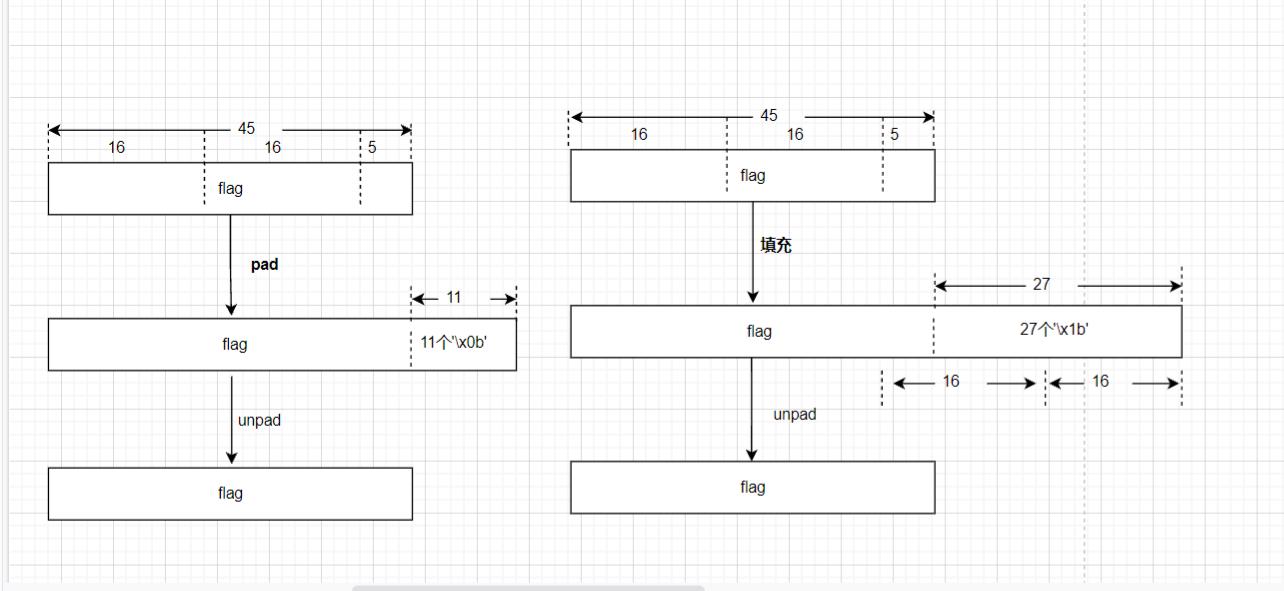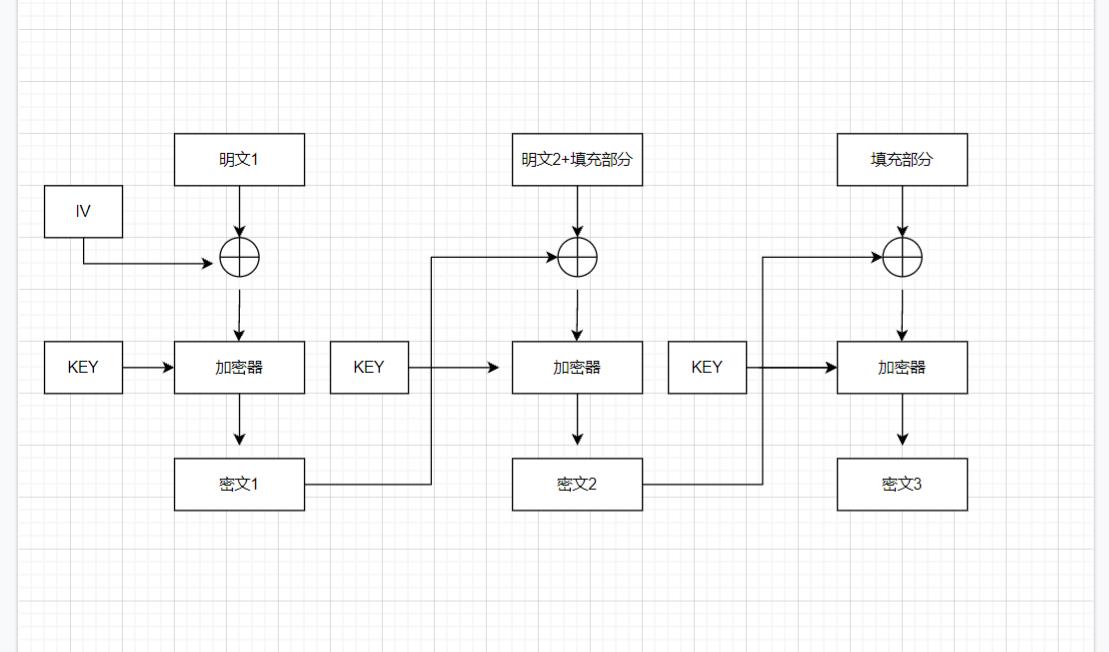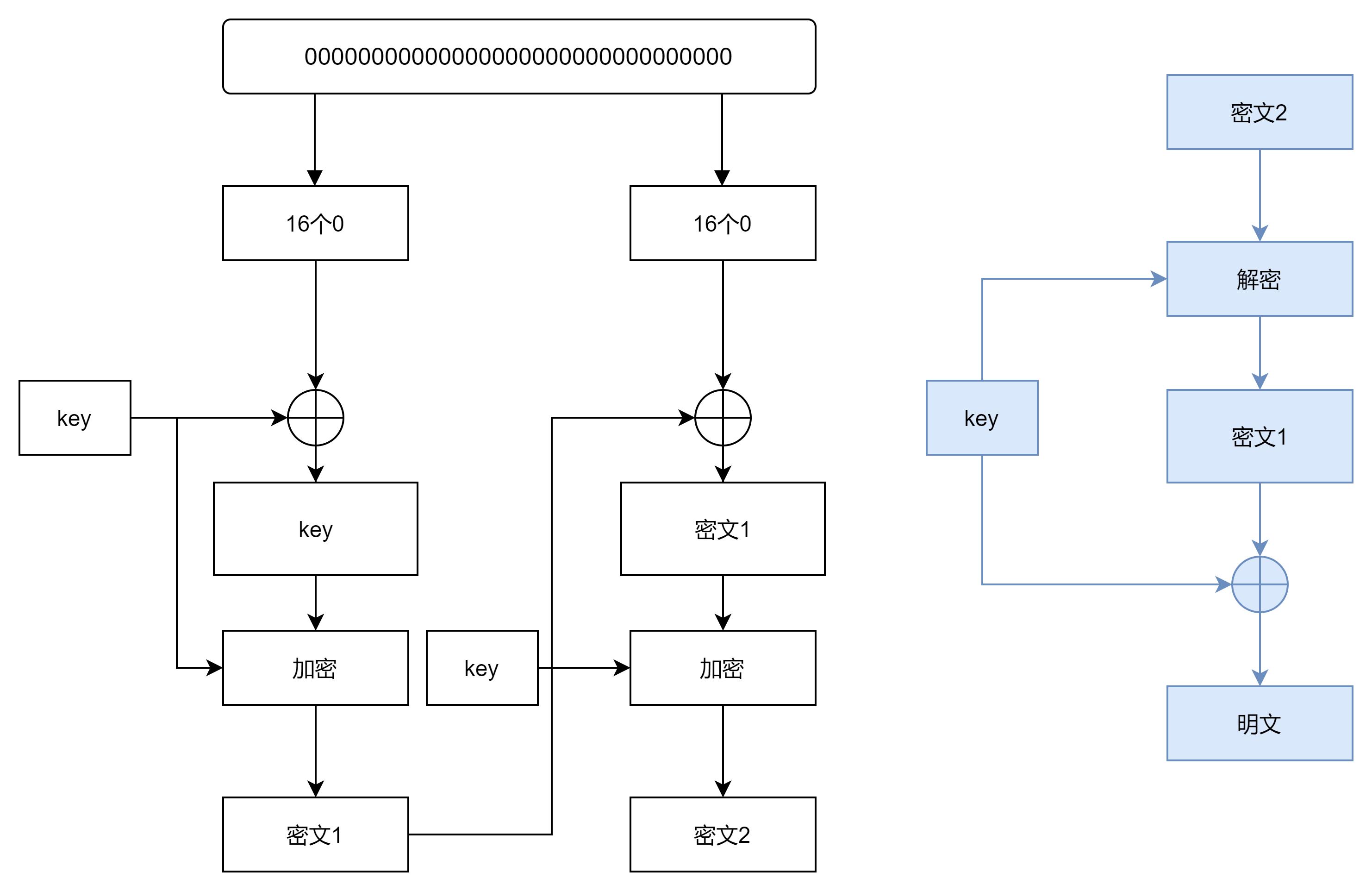第四届江西省高校网络安全技能大赛 复现 2021-09-30
Posted 路由(_)生
tags:
篇首语:本文由小常识网(cha138.com)小编为大家整理,主要介绍了第四届江西省高校网络安全技能大赛 复现 2021-09-30相关的知识,希望对你有一定的参考价值。
crypto
Yusa的密码学课堂—CBC第二课
题目:
from Crypto.Cipher import AES
import os
flag='DASCTF{********************************}'
BLOCKSIZE = 16
def pad(data):
pad_len = BLOCKSIZE - (len(data) % BLOCKSIZE) if len(data) % BLOCKSIZE != 0 else 0
return data + chr(pad_len) * pad_len
def unpad(data):
num = ord(data[-1])
return data[:-num]
def _enc(data,key,iv):
cipher = AES.new(key,AES.MODE_CBC,iv)
encrypt = cipher.encrypt(pad(data))
return encrypt
def enc(data,key):
try:
iv = raw_input("Your iv: ").decode('hex')
cipher = AES.new(key,AES.MODE_CBC,iv)
encrypt = cipher.encrypt(pad(data))
return encrypt
except:
exit()
def dec(data,key,iv):
try:
cipher = AES.new(key,AES.MODE_CBC,iv)
encrypt = cipher.decrypt(data)
return unpad(encrypt)
except:
exit()
def task():
try:
key = os.urandom(16)
iv = os.urandom(16)
cipher = _enc(flag,key,iv).encode('hex')
print cipher
paintext = raw_input("Amazing function: ").decode('hex')
print enc(paintext,key).encode('hex')
backdoor = raw_input("Another amazing function: ")
assert backdoor != cipher
if dec(backdoor.decode('hex'),key,iv) == flag:
print flag
else:
print "Wow, amazing results."
except Exception as e:
print str(e)
exit()
if __name__ == "__main__":
task()
大致的意思是,服务器会先给我们flag的密文,然后我们输入一个明文,服务器给出对应的密文,之后再输入一个与flag密文不同的密文backdoor,但是backdoor解出的明文必须与flag一样才会给出flag。
我们可以控制的是一个明文paintext ,一个密文backdoor 以及一个加密向量IV。
想要让不同的密文解出相同的明文,可能吗?不过这道题特殊的地方在 pad() 和 unpad() 上,这就是突破口!

所以,我们可以通过改变flag的填充部分(增大填充部分)来使得不同密文能解出相同明文。
那如何使得后来的填充部分跟flag填充完的部分结合在一起呢?
这里我们控制的IV就起到了作用。

从图中可以看出,利用flag密文的后16位作为IV,能使得填充部分跟flag融为一体,而填充的字符的ord() = len(flag),这样一来,明文填充后就是flag+服务器填充部分+我们自己的填充部分,密文的话就是服务器发送的flag密文+我们自己填充部分的密文,解密后再unpad的结果就是flag。
(大概的意思就是这样,可能思路有点不清晰)
代码:
from pwn import *
context.log_level = 'debug'
#context(os='linux', arch='amd64', log_level='debug')
#os设置系统为linux系统,arch设置架构为amd64,log_level设置日志输出的等级为debug
p = remote('49.233.13.133', '52001')#连接指定地址和端口
cipher = bytes.fromhex(p.recvline()[:-1].decode())#recvline(keepends = True)接收一行,keepends为是否保留行尾的\\n
c = cipher[-16:]
p.recvuntil(b'Amazing function:')#recvuntil(delims, drop=False)一直读到delims的pattern出现为止。
pad = chr(8+16).encode() * 16
p.sendline(pad.hex())#sendline(data)发送一行数据,相当于在数据末尾加\\n。
p.recvuntil(b'Your iv: ')
p.sendline(c.hex())
cx = bytes.fromhex(p.recvline()[:-1].decode())
p.recvuntil(b'Another amazing function: ')
backdoor = cipher + cx
p.sendline(backdoor.hex())
flag = p.recvline().decode()
print(flag)
Yusa的密码学课堂—CBC第三课
题目:
from Crypto.Cipher import AES
import os
flag='DASCTF{********************************}'
BLOCKSIZE = 16
def pad(data):
pad_len = BLOCKSIZE - (len(data) % BLOCKSIZE) if len(data) % BLOCKSIZE != 0 else 0
return data + "=" * pad_len
def unpad(data):
return data.replace("=","")
def enc(data,key):
cipher = AES.new(key,AES.MODE_CBC,key)
encrypt = cipher.encrypt(pad(data))
return encrypt
def dec(data,key):
try:
cipher = AES.new(key,AES.MODE_CBC,key)
encrypt = cipher.decrypt(data)
return unpad(encrypt)
except:
exit()
def s_2_l(data):#分组
s=[]
for i in range(len(data)//BLOCKSIZE):
s.append(data[BLOCKSIZE*i:BLOCKSIZE*(i+1)])
return s
def task():
try:
key = os.urandom(16)
asuy = enc(flag,key)
print asuy.encode('hex')
paintext = raw_input("Amazing function(in hex): ")
paintext = paintext.decode('hex')
print enc(paintext,key).encode('hex')
asuy = raw_input("Another amazing function(in hex): ").decode('hex')
yusa = dec(asuy,key)
flag_l = s_2_l(flag)
yusa_l = s_2_l(yusa)
for each in yusa_l:
if each in flag_l:
print(r"You're not yusa!")
exit()
print yusa.encode('hex')
except Exception as e:
print str(e)
exit()
if __name__ == "__main__":
task()
大致的意思是,服务器给flag的密文,我们发送一个明文paintext,收到对应的密文,再发送一个密文asuy,解密得到对应的明文yusa。再将flag和yusa分组,并要求yusa_1中不能含有flag_1的元素,满足就会给出yusa,不满足就退出。
这样看来满不满足都无法求出flag。
注意到这里用到的密钥key和向量IV是相同的。而且我们能控制输入的有一个明文和一个密文。
同样借助图片来理解:
假如我们输入的明文全是由0组成的,借助异或性质就可以消除一些不必要的麻烦,简化问题。

这样就可以很直观的看出 ,利用32个0作为第一次输入的明文,得到的密文的后16位作为第二次输入的密文,解出来的明文 = key ^ 密文1,然后我们就可以求出key,从而求出flag。
代码:
from pwn import *
from Crypto.Cipher import AES
def unpad(s):
return s.replace(b"=", b"")
context.log_level = 'debug'
sh = remote('49.233.13.133', '51903')
cipher = bytes.fromhex(sh.recvline()[:-1].decode())
c1, c2, c3 = cipher[:16], cipher[16:32], cipher[32:48]
sh.recvuntil(b'Amazing function(in hex): ')
plaintext = b'\\x00' * 32
sh.sendline(plaintext.hex())
cx = bytes.fromhex(sh.recvline()[:-1].decode())
sh.recvuntil(b'Another amazing function(in hex): ')
yusa = cx[16:32]
sh.sendline(yusa.hex())
asuy = bytes.fromhex(sh.recvline()[:-1].decode())
keyx = xor(asuy,cx[:16])
aes = AES.new(keyx, AES.MODE_CBC, keyx)
print(aes.decrypt(cipher))
Misc
奇奇怪怪的编码
编码1:++++++++[>>++>++++>++++++>++++++++>++++++++++>++++++++++++>++++++++++++++>++++++++++++++++>++++++++++++++++++>++++++++++++++++++++>++++++++++++++++++++++>++++++++++++++++++++++++>++++++++++++++++++++++++++>++++++++++++++++++++++++++++>++++++++++++++++++++++++++++++<<<<<<<<<<<<<<<<-]>>>>>>>++++++.>----.<-----.>-----.>-----.<<.+.<<<+++++++.------.>>>+.+.---.<<<.
编码2:([][(!![]+[])[!+[]+!+[]+!+[]]+([][[]]+[])[+!+[]]+(!![]+[])[+[]]+(!![]+[])[+!+[]]+([![]]+[][[]])[+!+[]+[+[]]]+(!![]+[])[!+[]+!+[]+!+[]]+(![]+[])[!+[]+!+[]+!+[]]]()+[])[!+[]+!+[]]+[!+[]+!+[]+!+[]+!+[]]+[!+[]+!+[]+!+[]+!+[]+!+[]+!+[]+!+[]+!+[]+!+[]]+[!+[]+!+[]+!+[]+!+[]+!+[]]+(!![]+[])[!+[]+!+[]+!+[]]+[+!+[]]+[!+[]+!+[]+!+[]]+([][(!![]+[])[!+[]+!+[]+!+[]]+([][[]]+[])[+!+[]]+(!![]+[])[+[]]+(!![]+[])[+!+[]]+([![]]+[][[]])[+!+[]+[+[]]]+(!![]+[])[!+[]+!+[]+!+[]]+(![]以上是关于第四届江西省高校网络安全技能大赛 复现 2021-09-30的主要内容,如果未能解决你的问题,请参考以下文章